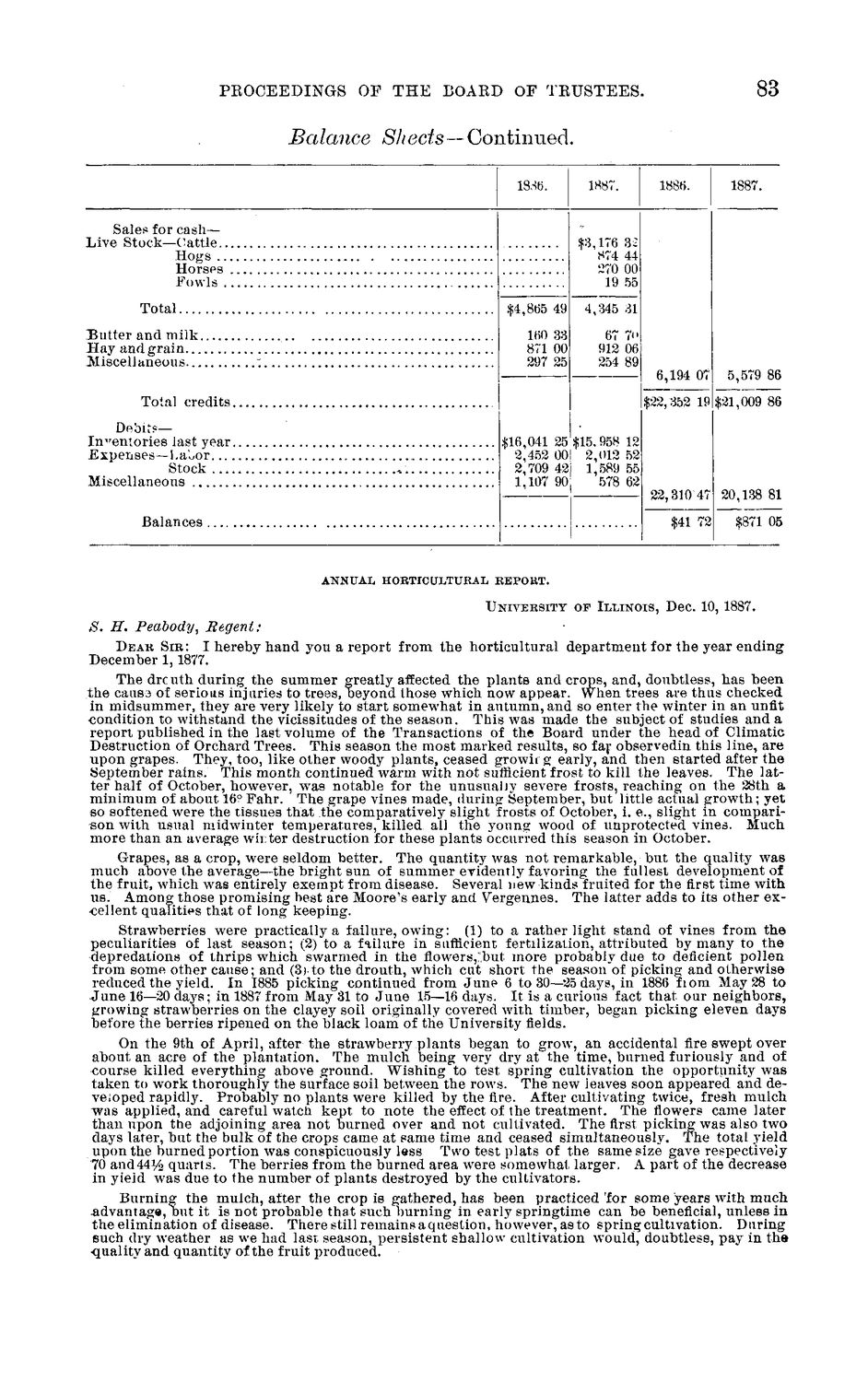| |
| |
Caption: Board of Trustees Minutes - 1888
This is a reduced-resolution page image for fast online browsing.

EXTRACTED TEXT FROM PAGE:
PKOCEEDINGS OF THE BOARD OF TRUSTEES. 83 Balance Sheds—Continued. 18,-56. 1887. 1886. 1887. Sales for c a s h Live Stock—Cattle Hogs Horses Fowls Total Hay and grain Miscellaneous Total credits Debit?— Inventories iast year Expenses—LaU)r Stock Miscellaneous Balances .$16,041 2,452 2,709 1,107 .$4,865 49 160 33 871 00 297 25 $3,176 874 270 19 32 44 00 55 4,345 31 67 7 > < 912 06 254 89 6,194 07 5,579 86 $22,352 19 $21,009 86 ~ . ^ 25 $15,958 12 00 2,012 52 42 1,589 55 90 578 62 22,310 47 20,138 81 $41 72 $871 05 ANNUAL HORTICULTURAL REPOUT. UNIVERSITY OF ILLINOIS, Dec. 10, 1887. J3, H. Peabody, Regent: DEAR SIR: I hereby hand you a report from the horticultural department for the year ending December 1,1877. The drc uth during the summer greatly affected the plants and crops, and, doubtless, has been the causa of serious injuries to trees, beyond those which now appear, when trees are thus checked in midsummer, they are very likely to start somewhat in autumn, and so enter the winter in an unfit condition to withstand the vicissitudes of the season. This was made the subject of studies and a report published in the last volume of the Transactions of the Board under the head of Climatic Destruction of Orchard Trees. This season the most marked results, so far observedin this line, are upon grapes. They, too, like other woody plants, ceased growit g early, and then started after the September rains. This month continued warm with not sufficient frost to kill the leaves. The latter half of October, however, was notable for the unusually severe frosts, reaching on the 28th a minimum of about 16° Fahr. The grape vines made, during September, but little actual growth; yet so softened were the tissues that the comparatively slight frosts of October, i. e., slight in comparison with usual midwinter temperatures, killed all the young wood of unprotected vines. Much more than an average wiiter destruction for these plants occurred this season in October. Grapes, as a crop, were seldom better. The quantity was not remarkable, but the quality was much above the average—the bright sun of summer evidently favoring the fullest development of the fruit, which was entirely exempt from disease. Several new kinds fruited for the first time with us. Among those promising best are Moore's early and Vergennes. The latter adds to its other excellent qualities that of long keeping. Strawberries were practically a failure, owing: (1) to a rather light stand of vines from the peculiarities of last season; (2) to a failure in sufficient fertilization, attributed by many to the depredations of thrips which swarmed in the flowers,:;but more probably due to deficient pollen from some other cause; and (3) to the drouth, which cut short the season'of picking and otherwise reduced the yield. In 1885 picking continued from June 6 to 30—25 days, in 1886 fiom May 28 to June 16—20 days; in 1887 from May 31 to June 15—16 days. It is a curious fact that our neighbors, growing strawberries on the clayey soil originally covered with timber, began picking eleven days before the berries ripened on the black loam of the University fields. On the 9th of April, after the strawberry plants began to grow, an accidental fire swept over about an acre of the plantation. The mulch being very dry at the time, burned furiously and of course killed everything above ground. Wishing to test spring cultivation the opportunity was taken to work thoroughly the surface soil between the rows. The new leaves soon appeared and developed rapidly. Probably no plants were killed by the fire. After cultivating twice, fresh mulch was applied, and careful watch kept to note the effect of the treatment. The flowers came later than upon the adjoining area not burned over and not cultivated. The first picking was also two days later, but the bulk of the crops came at same time and ceased simultaneously. The total yield upon the burned portion was conspicuously less Two test plats of the same size gave respectively 70 and 44^ quarts. The berries from the burned area were somewhat larger. A part of the decrease in yield was due to the number of plants destroyed by the cultivators. Burning the mulch, after the crop is gathered, has been practiced 'for some years with much advantage but it is not probable that such ourning in early springtime can be beneficial, unless in the elimination of disease. There still remains a question, however, asto spring cultivation. During such dry weather as we had last season, persistent shallow cultivation would, doubtless, pay in the •quality and quantity of the fruit produced.
| |